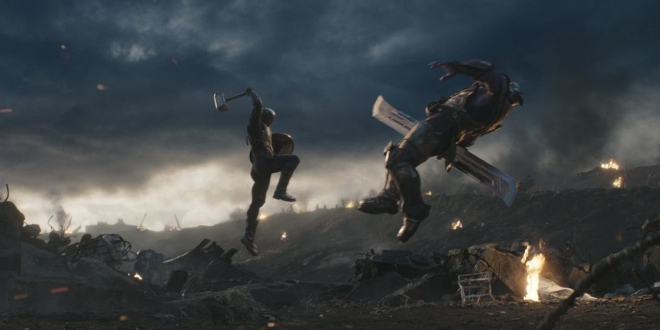10. Avengers: Endgame. Once you give in to the idea of episodic cinema—an idea that is not unique to the 21st Century and the domination of franchises—you adjust to certain aspects that will be part and parcel: the storytelling will be compressed; the characters will be defined more by their actions than dialogue; there will be CGI. With Avengers: Endgame, the Russo brothers managed to produce what J.J. Abrams could not: a more than satisfying final installment to a beloved series of films that has spanned over a decade, with callbacks and fan service that didn’t sink the story itself. True to its strengths within this framework, this second-part finale also managed to convert some detractors of last year’s Avengers: Infinity War (which, in many ways, was more about the villain than the heroes). The acting and the effects are more convincing than ever; and in delivering the goods in simple dramatic terms, the film never takes itself too seriously. If the MCU brand of filmmaking can be considered an art unto itself, then in terms of execution, Avengers: Endgame is among the best of what that subgenre has to offer.

9. Joker. From the end of one era in the comic book genre to what may be the beginning of another, David Ehrlich most concisely summarized the critical love and hate for Todd Phillips’ Joker: “unquestionably the boldest reinvention of ‘superhero’ cinema since The Dark Knight” and “a true original that’s sure to be remembered as one of the most transgressive studio blockbusters of the 21st Century” versus “a toxic rallying cry for self-pitying incels” and “a hyper-familiar origin story so indebted to Taxi Driver and The King of Comedy that Martin Scorsese probably deserves an executive producer credit” (who was, in fact, originally set to co-produce). Setting aside the cacophonous “discourse” concerning what a narrative film like this should (or should not) be saying—fueled by arguments that I find no more convincing than those made by, e.g., Tipper Gore in 1985—I would simply submit that, with Phillips’ use of cinematic language to invoke a particular time and place and Joaquin Phoenix’s typically atypical enigmatic performance, Joker does what it sets out to do quite well.

8. A Beautiful Day in the Neighborhood. Oscar-baiting biopics are not my favorites. In light of the recent release of a documentary that quite competently covered the phenomenon of Mr. Rogers (Won’t You Be My Neighbor? (2018)), there appears to be even less of a reason for this film to exist (other than the commercial reality that biopics tend to fill more seats in the cinema than docs). Based loosely on Tom Junod’s personal essay, Can You Say … Hero? (Esquire, 1998), A Beautiful Day in the Neighborhood offers a narrower, but deeper path into its subject matter – the perspective of a damaged man/boy (Matthew Rhys) tasked with writing 200 words on the public television icon (Tom Hanks). A whimsical sense of design, accenting the scene transitions, marks a welcome return to form for director Marielle Heller (Diary of a Teenage Girl (2015)); but it’s in the little moments between Rhys and Hanks where the film shines, as Heller manages to subtly contextualize Mr. Rogers’ philosophy and approach to communicating with children for the modern adult.

7. Waves. Being one of the few who were underwhelmed by writer/director Trey Edward Shults’ indulgent (sorry, “personal”) debut (Krisha (2015)), his third feature utterly took me by surprise. As a simple family drama that has generated violently mixed reviews, Waves lives or dies in its second half. To be sure, a little piece of me wanted this film to end near the middle (with a scene involving a shy boy asking a sullen girl out on a date); but Shults keeps going, judiciously weaving elements of Malickian storytelling into scenes built on seemingly effortless dialogue. I haven’t reconciled how I feel about that second half, and I was left with no desire to revisit this exhausting film any time in the foreseeable future; but too many elements worked too well to leave this film off of this list. There is not a weak link in this ensemble. And although I suspect that the score by Trent Reznor and Atticus Finch is the one element most likely to be noticed this awards season, the soundtrack is virtually devoid of imperfection.

6. Knives Out. I suppose it should come as no surprise that the trailer for writer/director Ryan Johnson’s well-earned emancipation from the Star Wars franchise—which, simply enough, presents as a 21st Century Clue (1985) populated by a scenery-chewing ensemble of familiar faces—is itself a bit of a con. To be sure, Knives Out is at its core a whodunnit. But Johnson’s latest effort—which, oddly enough, bears a thematic through line with The Last Jedi (2017)—actually works best in comedy-of-errors mode, as its chronically honest main character (not coincidentally, the least familiar face in the cast, Ana de Armas) attempts to scheme with the best of them.

5. JoJo Rabbit. There’s a certain mischievousness to the conceit of JoJo Rabbit, or more specifically, how that concept was rolled out to audiences. Upon reading the buzz or catching the trailer, one might have expected a film about a 10-year old Nazi youth, coming of age with the aid of imaginary friend Adolph Hitler, to amount to little more than a tasteless provocation. Or given the race of writer/director, one might feel entitled to a film that is, first and foremost, an incisive critique of white supremacy. But one would be disappointed on both fronts, although that disappointment might say more about the viewer than the filmmaker. After all, this sprang from the imagination of Taika Watiti (What We Do in the Shadows (2014) and Hunt for the Wilderpeople (2016)). So what we do get is equal parts silly and sad, all of which adds up to a deceptively simple—but for the open-minded and open-hearted, no less affecting—exercise in pure humanism.

4. Midsommar. Fresh on the heels of last year’s divisive horror hit, Hereditary, writer/director Ari Aster returns with the sun-bathed Midsommar, which Jordan Peele lauded as “the most idyllic horror movie of all time,” usurping one of its reference points, The Wicker Man (1973), as “the most iconic pagan movie.” That’s high praise coming from a writer/director who has received a lot of high praise of late. But in this instance, that praise is earned, once again, through impeccable craft and performances that have raised the bar for the genre. Somehow Aster manages to telegraph the plot (from the opening plate, through the art hanging on a grad student’s walls, etc.) while simultaneously tantalizing the viewer with visual and aural details that beg to be decoded (e.g., the subtle, but distinctly deep male voice, cackling on as our protagonist receives some really bad news over the phone). At its best, Midsommar is a film that offers engagement and haunts the viewer who chooses to engage.

3. The Art of Self-Defense. I have no idea what writer/director Riley Stearns actually had in mind for his third feature film, but on a repeated viewing, I just couldn’t help but imagine the hypothetical process of updating Fight Club (1999)—in many ways, the ultimate punctuation mark to a decade of post-modernism—in the wake of the last two decades of cultural evolution. Sure, there would be some room for irony, but it just could not be as fun or funny as it used to be. The absurdity, on the other hand, would be off the charts, as would a more pointed focus on toxic masculinity. Much of the subtext would have to become – well, just text. And you’d need to keep it small, because the industry just isn’t funding as much mid-budget, middlebrow cinema.

2. Luce. I’ve been keeping track of top 10 lists for almost 30 years, and I don’t think I’ve ever seen a bigger comeback for a director than Julius Jonah’s in 2019 (The Cloverfield Paradox (2018)). In the case of Luce, Jonah overcomes the challenge of adapting a stage play (by co-screenwriter J.C. Lee) in cinematic terms. In addition to the shrewd casting of Naomi Watts and Tim Roth (from Michael Haneke’s sociologically provocative Funny Games (2007)), the ensemble is virtually flawless in my book; but on second viewing, the plot ambiguity that seems to have frustrated so many viewers gives way to an emotional ambiguity that enriches this anti-parable, courtesy of Kelvin Washington Jr.’s lead performance. It is a film miscast as a “thriller” that, within the relatively low stakes of high school melodrama, succeeds in exposing a myriad of perceptions and realities surrounding race, gender, and nationality. That said, it is no surprise that Luce generated relatively little attention during its theatrical release or that much of the criticism that it did generate tended to reveal an American Left doggedly insistent upon ideological purity-in-messaging (e.g., https://www.rogerebert.com/reviews/luce-2019).

1. Parasite. Truth be told, I am growing a bit weary of the preoccupation with class warfare reflected in so much contemporary popular cinema around the world; and yet that preoccupation is reflected in two other films on this list as well. One part of me loathes having a multi-award-winning movie at the top of this list; and yet another part of me loathes such loathing. I am also not the biggest fan of one of America’s most popular film critics, A.O. Scott (New York Times); and yet, in his initial review, Scott articulated—way better than I could—why Parasite sits so comfortably in my wheelhouse (“troubling and wildly entertaining, … smart, generous, aesthetically energized … obliterat[ing] the tired distinctions between art films and popcorn movies”). Right smack in the heart of contradiction, that’s where we want to be, I suppose. In any case, I consider writer/director Bong Joon-ho’s Parasite a welcome step forward in his oeuvre. Throughout the first act, one character observes on more than one occasion that “it’s all so metaphorical,” but ironically enough, Parasite turns out to be less of an allegorical sledgehammer than either of his two prior films (Snowpiercer (2013), Okja (2017)).
Honorable mentions: Booksmart, Clemency, The Farewell, Hail Satan!, The Irishman, The Last Black Man in San Francisco
Most overrated: A Hidden Life, High Life, The Souvenir
No thanks, I’ll pass: Climax, Knock Down the House, Varda by Agnes





